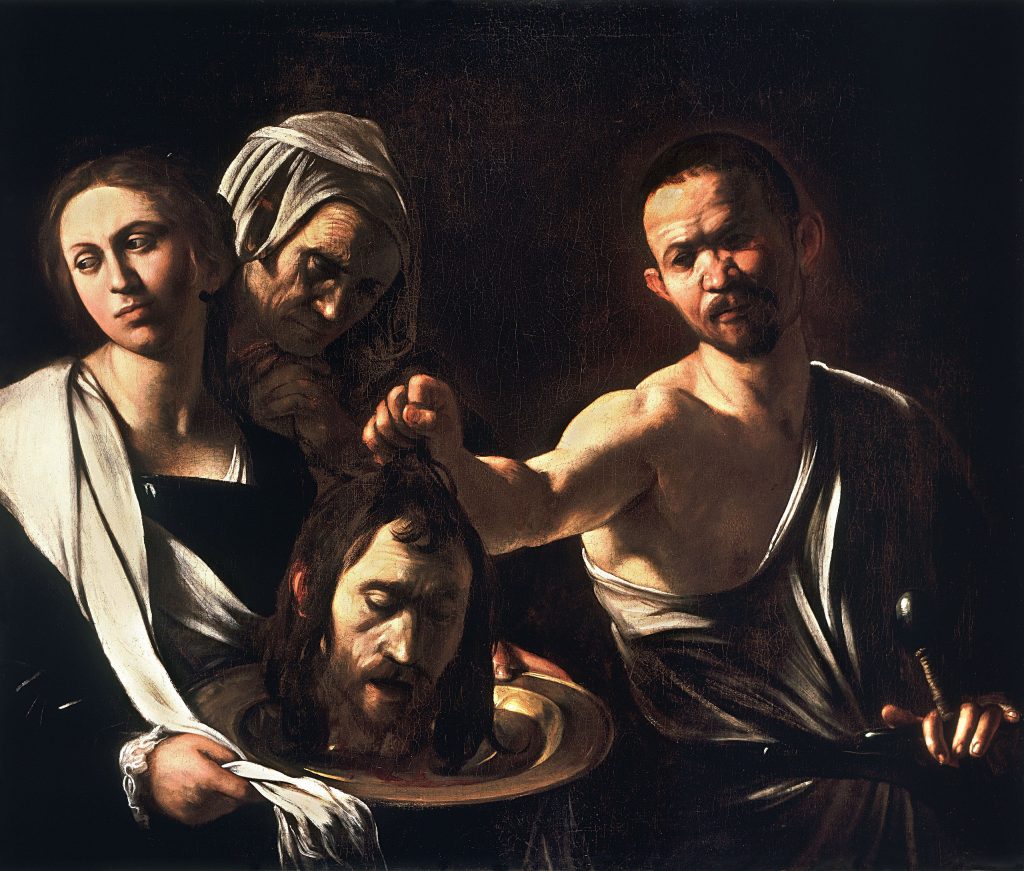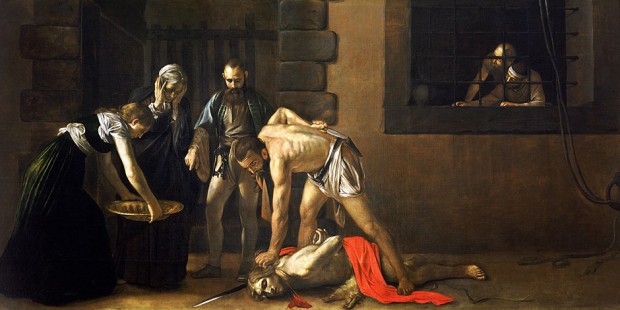
I find it very interesting that St. Mark is telling us the story of the martyrdom of John the Baptist by way of a flashback.
First he tells us that the reputation of a new prophet from Nazareth called Jesus is beginning to spread throughout Galilee until it reaches the notorious Governor Herod Antipas, son of the King Herod who massacred the innocent children during the time that Jesus was born, as told to us by Matthew.
This family seems to have a track record for being a whole bunch of murderers.
Mark tells us the rumors had reached the Governor that a man who sounded very much like Elijah, or one of the prophets, or even John the Baptist, was becoming the new sensation in Galilee. Herod is reacting to the news like a nervous wreck. His guilty conscience is disturbing him. He talks like a psychopath who is horrified by the thought of being revisited by the ghosts of the past. He thinks he is being pursued by the crimes that he had committed. I imagine him sleepless, unable to eat, gradually turning paranoid about a moment of reckoning. In short, he is losing his head. Like a mad man, he thinks the prophet whom he had beheaded had come back to life to confront him.
And now Mark proceeds to make a flashback of the story of the events that led to the prophet’s execution as if it were being recalled by Herod himself.
Being a storyteller myself, I must say I am extremely fascinated by Mark’s way of narrating it. He makes it so graphic, in today’s rules on newsreporting, the reporter would probably have to apologize and warn the parents that what follows is gory and brutally violent and may be shocking to kids, so parental guidance might be adviseable.
Mark’s flashback story brings to mind a traumatic experience of mine when I was a young boy. My mother was having a difficulty slaughtering a duck for lunch, to make caldereta. Even if the poor bird had already been drained of its blood, it looked like it was still resisting; it was still struggling to wriggle off my mother’s grasp. So she asked me to assist her by holding the duck’s body firmly as she proceeded to cut off the duck’s head. As soon as the head part was severed, the rest of the bird’s body jerked off and I myself was jolted. Because of that I lost grip of its body, it got loose and started running around! It was my first time ever to see a headless duck running around without direction.
This is how Mark is asking us to imagine what had become of the whole Jewish society. They had become very much like a headless body. You will understand the purpose of this flashback story, if you recall what went before it and what goes after it.
Before this, Mark has just told us that Jesus had dispatched his 12 apostles out on a mission. And then the flashback story of the beheading follows. What goes after is the return of the twelve. Mark tells us Jesus invites them to come away by themselves to a deserted place and rest a while. But a whole crowd of people would run after them on foot and even get ahead of them on the other side of the lake. Mark then tells us when he disembarks, Jesus is moved with compassion at the sight of the crowd that has been following him because they were—listen to how he describes them—“like sheep without a shepherd.” Then you get to understand the connection with the earlier flashback, “like a body without a head.”

It is the reason why he is narrating the story this way. In English they would call this a parody, a style of writing with a deliberate exaggeration for comic effect. Take note how he caricatures all his characters as figuratively HEADLESS!
Start with Herod himself. He behaves like a lame duck leader. He does what he does not want to do because of political pressure. In a state of intoxication he has made a promise to give the dancing girl whatever she asked for. Next, you have the dancing girl herself, another headless character. She does not even know what to ask for. And when she is told to ask for the head of the prophet, she quickly obeys like a mindless automaton. Then you have Herodias. Well you might say this woman is headless in a different way. What she has is not a human head but a serpent’s head; she is every bit scheming, manipulative, and murderous.
You still have many other characters in the story: the “courtiers, the military officers, and the leading men of Galilee”. They are also portrayed as headless in the sense that they are nameless and faceless. They are there like a stupid audience, or like a chorus in a Greek drama. They are just there in the background, totally mindless of the disgusting sight of the prophet’s head served like food on a silver platter. They go on with their party anyway. Finally, you have the executioners who are dispatched; they are headless too. They just implement the order with no questions asked. They just made sure they covered their faces. They are no different from modern day death squads who carry out the extrajudicial killings around us.
What is the point? Mark is portraying the whole of Galilee like a headless society, like a decapitated duck running without direction. Why? Because they would not allow God to lead them or to be their head; they would not listen to the prophet. And so to silence him like they had done with other prophets before, they get rid of him.
Fast forward—Jesus could not bear the sight of a headless flock. He responds to their need for a Shepherd by attending to them. He preaches to them, heals their sick and later feeds them. Mark is suggesting that it is Jesus who is now filling in the vacuum of leadership in the community left behind by John; he does not run away from the call. After all, he has been prepared well by his mentor for this. From here on, he will set his course towards Jerusalem and prepare to give up, not just his head, but his whole life, body and blood.
He will fulfill what John himself had foretold, when John first introduced him to Andrew and Philip: “Behold the lamb of God who takes away the sins of the world.”
“A headless society” is a homily delivered by Bishop Pablo Virgilio David of Kalookan for August 29, 2020, Saturday of the 21st Week in Oridinary Time and Feast of the Passion of John the Baptist, Mark 6:17-29
Source: Licas Philippines
0 Comments